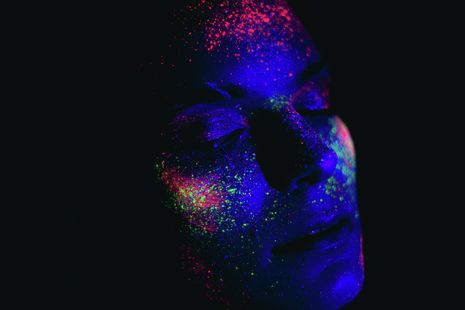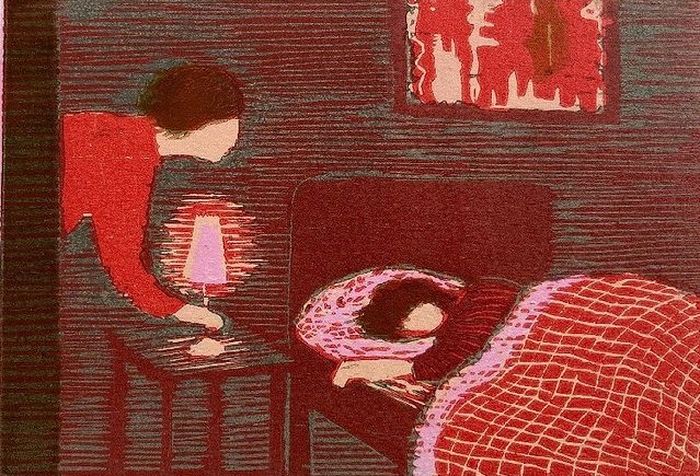On apathy, and other things you shouldn’t feel
Sionna Hurley-O’Kelly writes on the concept of “illegitimate” emotions

Somebody has left out neon face paint on the kitchen counter, and the visages of the partygoers exhibit arcane patterns and symbols in pink, purple, and green. Suspended on a back wall is the colossal face of Nena, her lips tracing the lyrics of 99 Luftballons just a half-second off the pace of the audio. A rumble of conversation issues through the room. I stand against the kitchenette, the metal counter pressing into my back. Now and then, a half-acquaintance on my right rotates fifteen degrees towards me: an attempt to induce conversation which goes unreturned.
Having made a few vain attempts at integration earlier, I’ve altered my approach. I am now a wallflower, anchored to the edge of the scene and gazing out at the neon faces in the ever-diminishing hope that some amiable stranger might take notice. A vague sense of shame lingers from my previous efforts to coax out the more attractive side of my personality, which returned only a strange and mangled caricature of myself. And while my current vow of silence will do less harm, the outcome of my vigil is unlikely to be a happy one. As ABBA starts up on the speaker and the bearded face of Benny Andersson looms before me in celestial proportions, I decide to cut my losses and go home.
“Social stigmas may render us unwilling to admit to ourselves or others our true emotions”
In January 2020, I experienced the last full-blown episode of an emotional phenomenon which I now call “tunnel vision”. As in the scene above, I found myself at a party, struggling to connect with people. That evening, however, ended not with a retreat in sad, but sensible, resignation, but instead with a haze of panic. For several hours I moved about erratically, in one moment seeking out my friends, crying and shouting in turn; in the next, hiding away to wait for the situation to end. I was overwhelmed by a desperate urge to act, yet had no clear purpose in mind. “No intent but intent itself,” as I later described it. Ultimately, just after 3 AM, I found myself alone, lying in the shadow of a fence beside my own house. I was somehow unable to enter, as though, so long as I remained outside, there was still hope of redemption.
Tunnel vision: as if trapped in a narrow passageway, I felt a desperate impulse to run towards a vague, inexpressible goal. My feelings and actions seemed so irrational that I was unable to reconcile them with my otherwise coherent self-image. And when my friends demanded an explanation, my garbled blend of what-was-true and what-seemed-credible brought only cool disapproval to their faces. None of us could understand it, and to my friends, my unintelligible descriptions sounded like a bid to excuse what was either egocentric attention-seeking or Jacobean melodrama.
“I became able to recognise, anticipate, and eventually control my feelings”
It was only when, a few days later, I first put it into writing, that I began to understand my experience. This act of committing my feelings to paper seemed somehow to legitimise them as if by reducing my emotions to stable, linear forms, I could counter the sense of disingenuity created by their incoherence. I began to keep a diary with simple combinations of cause, feeling, and effect. Eventually, I came to recognise that my “tunnel vision” arose from desire, instinct, and reason. Desire for affection and, having acted badly, for redemption. An instinct to force myself upon others until I achieved these goals. And, in competitions with these urges, an awareness that no good would come from pursuing them, leading me to run away from the situation. What seemed unintelligible was in fact a confusion of conflicting instincts. By beginning to understand the nature of “tunnel vision”, I became able to recognise, anticipate, and eventually control my feelings.
The phenomenon of “tunnel vision” has been one of several emotional experiences which are hard to comprehend and accept. These impalpable feelings have included apathy, detachment, and other sentiments, for which I have no words. Sometimes the problem lies in the sense of taboo that surrounds our more Freudian impulses: social stigmas may render us unwilling to admit to ourselves or others our true emotions. We might, for example, refuse to accept that we’ve fallen out of love, since society presents this loss of affection as something akin to a weakness of character through terms such as ‘fickleness’ and through film and literary tropes (we all chide that dreadful cad Romeo for his flippant renunciation of Rosaline, do we not?).
But sometimes, we simply have no words for our emotions. An internet search of phrases like “I don’t understand how I feel” reveals numerous Reddit threads and Quora forums where anonymous authors convey their struggles to verbalise emotions, and their consequent difficulty in tackling their experiences. A recurring aspect of these posts is a sense that, without universally-accepted terminology to describe their feelings, the authors are often dismissed as disingenuous or overly-dramatic by the people in whom they confide.
Progress has been made in recent times to expand our repertoire of socially-recognised emotions, with growing public awareness of conditions such as Anxiety and Seasonal Affective Disorder. Still, however, there is a tendency, reflected in the forums of the internet and the cold reactions of my friends, to reject as invalid any feelings which transgress a strict selection of standardised emotions. Without widespread social recognition of complex feelings and the diverse nature of emotional experience, it is difficult to understand and manage our more complicated instincts. Only rarely, in the work of a particularly insightful author or a particularly honest conversation, do we find reflections of these “illegitimate” feelings. Only then are we reminded that there exist more things in the human heart and mind than the wheel of emotion would have us believe.
 Comment / Plastic pubs: the problem with Cambridge alehouses 5 January 2026
Comment / Plastic pubs: the problem with Cambridge alehouses 5 January 2026 News / Uni-linked firms rank among Cambridgeshire’s largest7 January 2026
News / Uni-linked firms rank among Cambridgeshire’s largest7 January 2026 News / SU stops offering student discounts8 January 2026
News / SU stops offering student discounts8 January 2026 News / New movement ‘Cambridge is Chopped’ launched to fight against hate crime7 January 2026
News / New movement ‘Cambridge is Chopped’ launched to fight against hate crime7 January 2026 News / Cambridge businesses concerned infrastructure delays will hurt growth5 January 2026
News / Cambridge businesses concerned infrastructure delays will hurt growth5 January 2026









